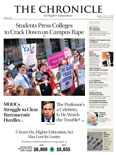Chinese Scholars Understand Peer Review’s Strengths, Weaknesses
To the Editor:
Michèle Lamont and Anna Sun (“How China’s Elite Universities Will Have to Change,” The Chronicle, December 10) argue for the need to “embrace a culture of academic peer review that is only beginning to develop” in China. The recent publication of the Chinese translation of Ms. Lamont’s excellent How Professors Think: Inside the Curious World of Academic Judgment, which joins the Chinese translation of Daryl Chubin and Edward Hackett’s classic Peerless Science: Peer Review and U.S. Science Policy, will no doubt contribute to the vital discussion of peer review in China.
We draw your attention to another recent manifestation of this conversation—an international conference on “Peer Review, Research Integrity, and the Governance of Science” organized by Dean Hong Xiaonan at Dalian University of Technology in May 2012. This conference was accompanied by the simultaneous publication of a 500-plus-page bilingual Chinese-English book, Peer Review, Research Integrity, and the Governance of Science—Practice, Theory, and Current Discussions, by Robert Frodeman, J. Britt Holbrook, Carl Mitcham, and Hong Xiaonan (People’s Press, 2012).
As collaborators in the conference and on the book, our experience is that our Chinese colleagues are as aware as their American counterparts not only of the need for peer review, but also of its limitations—including especially the challenge of developing a distinctively Chinese culture of peer review that protects academic freedom and inspires trust both inside and outside of China. Indeed, we venture to suggest that American academics might also learn from Chinese scholars in this regard.
Carl Mitcham
Professor
Liberal Arts & International Studies
Colorado School of Mines
Golden, Colo.
J. Britt Holbrook
Assistant Director
Center for Interdisciplinarity
Professor
Department of Philosophy and Religion Studies
University of North Texas
Denton, Tex.


